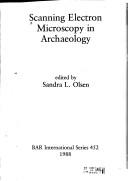| Listing 1 - 3 of 3 |
Sort by
|

ISBN: 0860545792 Year: 1988 Volume: vol 452 Publisher: Oxford : BAR,
Abstract | Keywords | Export | Availability | Bookmark
 Loading...
Loading...Choose an application
- Reference Manager
- EndNote
- RefWorks (Direct export to RefWorks)
Book
ISBN: 9789639911789 Year: 2016 Publisher: Budapest : Archaeolingua Alapítvány,
Abstract | Keywords | Export | Availability | Bookmark
 Loading...
Loading...Choose an application
- Reference Manager
- EndNote
- RefWorks (Direct export to RefWorks)
Book
ISBN: 9781407358024 1407358022 Year: 2021 Publisher: Oxford Bar Publishing
Abstract | Keywords | Export | Availability | Bookmark
 Loading...
Loading...Choose an application
- Reference Manager
- EndNote
- RefWorks (Direct export to RefWorks)
Archaeological lithic residue analysis investigates the microscopic and chemical traces left behind by people on stone tools. These lithic residues provide detailed and compelling evidence of specific food and technological activities, and tool manufacturing choices. Interest in the study of lithic residues has grown substantially in the past decade, reflected by an increasing number of publications and a proliferation of techniques applied to their study. This monograph offers a recent and critical review of these technical advances to help archaeologists determine best practice today. The book focuses on the development of appropriate methods for improving the identification and interpretation of residues on stone tools. Over 40 techniques are reviewed, including transmitted and reflected visible light microscopy (VLM), scanning electron microscopy-energy dispersive X-ray spectroscopy (SEM-EDS), Raman microspectroscopy, gas chromatography-mass spectrometry (GC-MS), and Fourier transform infrared microspectroscopy (FTIRM).
Archaeology --- Stone implements --- Tools, Prehistoric --- Scanning electron microscopy in archaeology. --- Methodology. --- Analysis. --- Scanning electron microscopy in archaeology --- Implements, Prehistoric --- Implements, utensils, etc., Prehistoric --- Prehistoric implements --- Prehistoric tools --- Flint implements --- Lithic implements --- Implements, utensils, etc. --- Debitage --- Methodology --- Analysis --- Archaeological scanning electron microscopy
| Listing 1 - 3 of 3 |
Sort by
|

 Search
Search Feedback
Feedback About UniCat
About UniCat  Help
Help News
News